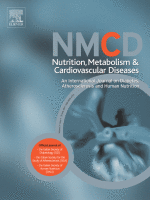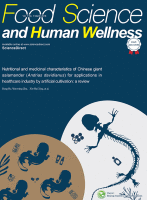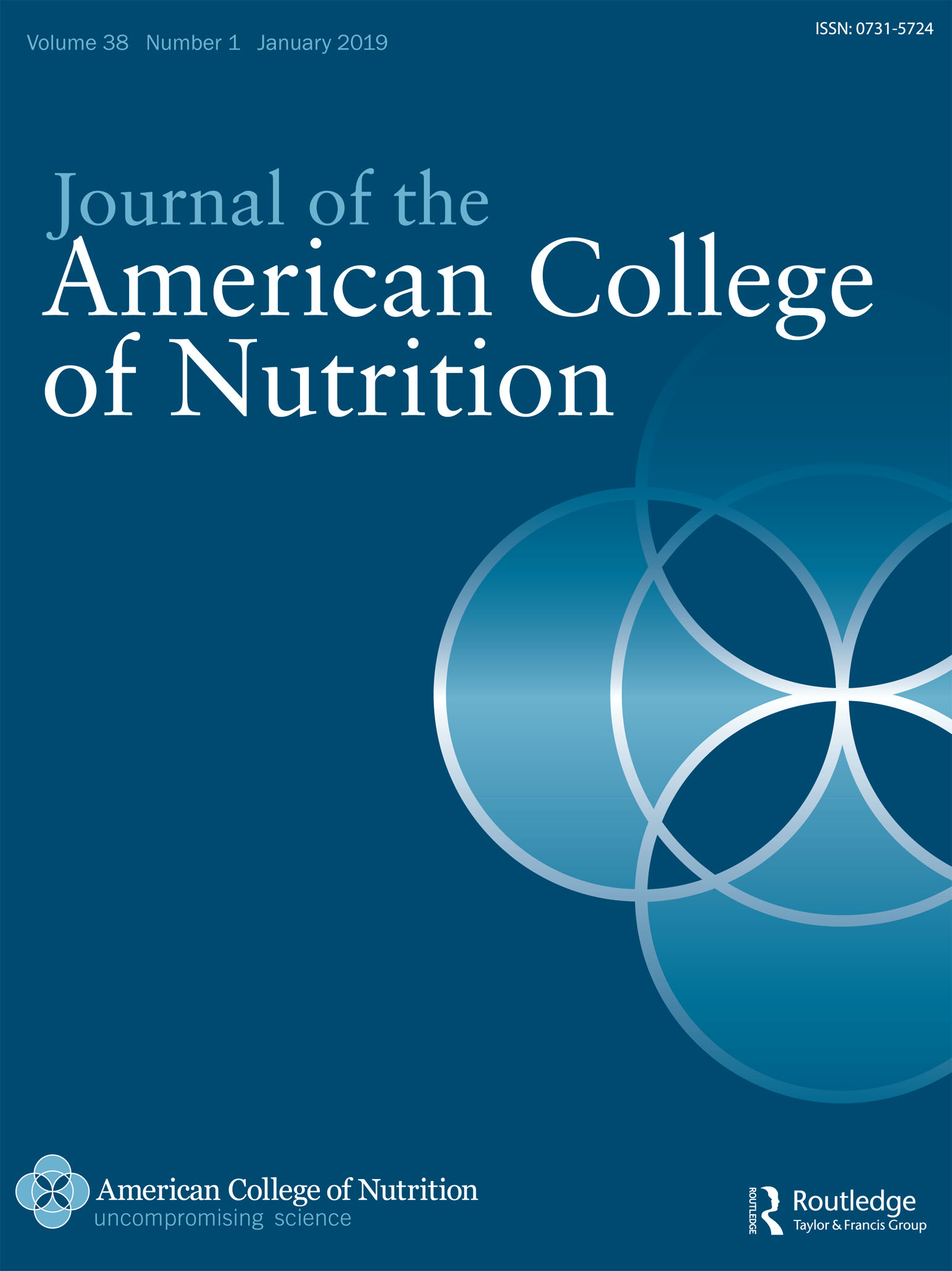Canola Oil
How to submit an article:
- Registered users can submit any published journal article that has a unique DOI (Digital Object Identifier) name or link to Research Hub.
- For example, you can paste the full DOI link:
https://doi.org/10.1109/5.771073or just the DOI name:10.1109/5.771073into the field above and click submit. - The person who is first to submit a valid article to Research Hub will forever be credited for it, and every article submission earns you +6 Research Points.
Published research studies are articles that present the findings of original research that has undergone a peer-review process and has been made publicly available in scholarly journals, books or other media.

The Mediterranean and Nordic Diet: A Review of Differences and Similarities of Two Sustainable, Health-Promoting Dietary Patterns
2021 Jun 25 Frontiers in Nutrition Krznarić , Karas I, Ljubas Kelečić D, Vranešić Bender D
The main difference between the two diets lies in their primary fat sources, with olive oil being synonymous with the MD and rapeseed/canola oil being more prevalent in the ND. Longitudinal epidemiological studies support the MD as a preventive measure against chronic diseases, while the ND requires further research due to discrepant results. Nevertheless, studies suggest that both diets may be associated with lower risks of chronic diseases, disability, and mortality. Future longitudinal and large prospective studies are needed to provide more evidence-based recommendations.
Review Article Nordic Diet
The effects of foods on LDL cholesterol levels: A systematic review of the accumulated evidence from systematic reviews and meta-analyses of randomized controlled trials
2021 May Nutrition, Metabolism and Cardiovascular Diseases Schoeneck M, Iggman D
Systematic Review Turmeric Walnut Avocado Tumeric Almond Green Tea Tomato FlaxseedConsumption of certain foods like rapeseed/canola oil, avocados, and turmeric can lead to moderate to large reductions in LDL cholesterol levels.

Chronic consumption of thermally processed palm oil or canola oil modified gut microflora of rats
2021 Jan Food Science and Human Wellness Ruan M, Bu Y, Wu F, Zhang S, Chen R, Li N, et al.
Heated canola oil consumption elevated plasma total cholesterol and LDL-c levels compared with unheated canola oil, while heated palm oil did not have these effects. Additionally, consumption of heated palm oil significantly increased the relative abundance of Lactobacillus and Roseburia in the gut compared with non-heated palm oil or both canola oil groups. The heating process may enhance the effects of palm oil on the proliferation of probiotics like Lactobacillus and weaken the effects of canola oil on cholesterol transport and metabolism.
Experimental Study Palm Oil Gut Microbiota
The effects of Canola oil on cardiovascular risk factors: A systematic review and meta-analysis with dose-response analysis of controlled clinical trials
2020 Nov Nutrition, Metabolism and Cardiovascular Diseases Amiri M, Raeisi-Dehkordi H, Sarrafzadegan N, Forbes SC, Salehi-Abargouei A
Canola oil (CO) significantly reduced total cholesterol, low-density lipoprotein cholesterol (LDL-C), LDL-C to high-density lipoprotein cholesterol ratio (LDL/HDL), total cholesterol to HDL ratio (TC/HDL), apolipoprotein B (Apo B), and Apo B/Apo A-1 compared to other edible oils, including olive oil, sunflower oil, and saturated fats. Replacing CO with ~15% of total caloric intake provided the greatest benefits based on the nonlinear dose–response curve.
Systematic Review Meta-Analysis Canola Oil
The effects of extra virgin olive oil and canola oil on inflammatory markers and gastrointestinal symptoms in patients with ulcerative colitis
2020 Jan 03 European Journal of Clinical Nutrition Morvaridi M, Jafarirad S, Seyedian SS, Alavinejad P, Cheraghian B
Clinical Study Randomised Controlled Trial Ulcerative Colitis Extra Virgin Olive OilExtra virgin olive oil (EVOO) intake can reduce inflammatory markers and improve gastrointestinal symptoms in patients with Ulcerative Colitis.
Research insights are moderated by the Research Hub team and offer an at-a-glance overview of interesting research findings.

2021 Nutrition, Metabolism and Cardiovascular Diseases
Consumption of certain foods like rapeseed/canola oil, avocados, and turmeric can lead to moderate to large reductions in LDL cholesterol levels.
Systematic Review Almond Avocado Flaxseed Green Tea Tomato
The effects of foods on LDL cholesterol levels: A systematic review of the accumulated evidence from systematic reviews and meta-analyses of randomized controlled trials
Schoeneck M, Iggman D

2020 European Journal of Clinical Nutrition
Extra virgin olive oil (EVOO) intake can reduce inflammatory markers and improve gastrointestinal symptoms in patients with Ulcerative Colitis.
Clinical Study Extra Virgin Olive Oil Ulcerative Colitis
The effects of extra virgin olive oil and canola oil on inflammatory markers and gastrointestinal symptoms in patients with ulcerative colitis
Morvaridi M, Jafarirad S, Seyedian SS, Alavinejad P, Cheraghian B
Review Articles
Review articles summarise and critically evaluate the current state of research on a specific topic or field by synthesising multiple primary research studies.

The Mediterranean and Nordic Diet: A Review of Differences and Similarities of Two Sustainable, Health-Promoting Dietary Patterns
2021 Jun 25 Frontiers in Nutrition Krznarić , Karas I, Ljubas Kelečić D, Vranešić Bender D
The main difference between the two diets lies in their primary fat sources, with olive oil being synonymous with the MD and rapeseed/canola oil being more prevalent in the ND. Longitudinal epidemiological studies support the MD as a preventive measure against chronic diseases, while the ND requires further research due to discrepant results. Nevertheless, studies suggest that both diets may be associated with lower risks of chronic diseases, disability, and mortality. Future longitudinal and large prospective studies are needed to provide more evidence-based recommendations.
Review Article Nordic Diet
The effects of foods on LDL cholesterol levels: A systematic review of the accumulated evidence from systematic reviews and meta-analyses of randomized controlled trials
2021 May Nutrition, Metabolism and Cardiovascular Diseases Schoeneck M, Iggman D
Systematic Review Turmeric Walnut Avocado Tumeric Almond Green Tea Tomato FlaxseedConsumption of certain foods like rapeseed/canola oil, avocados, and turmeric can lead to moderate to large reductions in LDL cholesterol levels.

The effects of Canola oil on cardiovascular risk factors: A systematic review and meta-analysis with dose-response analysis of controlled clinical trials
2020 Nov Nutrition, Metabolism and Cardiovascular Diseases Amiri M, Raeisi-Dehkordi H, Sarrafzadegan N, Forbes SC, Salehi-Abargouei A
Canola oil (CO) significantly reduced total cholesterol, low-density lipoprotein cholesterol (LDL-C), LDL-C to high-density lipoprotein cholesterol ratio (LDL/HDL), total cholesterol to HDL ratio (TC/HDL), apolipoprotein B (Apo B), and Apo B/Apo A-1 compared to other edible oils, including olive oil, sunflower oil, and saturated fats. Replacing CO with ~15% of total caloric intake provided the greatest benefits based on the nonlinear dose–response curve.
Systematic Review Meta-Analysis Canola Oil
Effects of Canola Oil Consumption on Lipid Profile: A Systematic Review and Meta-Analysis of Randomized Controlled Clinical Trials
2018 Oct 31 Journal of the American College of Nutrition Ghobadi S, Hassanzadeh-Rostami Z, Mohammadian F, Zare M, Faghih S
Canola oil (CO) consumption significantly reduced TC and LDL, with no significant effects on HDL, TG, Apo B, and Apo A1. Subgroup analyses indicated that the effects on TC and LDL were more pronounced in participants over 50 years of age and with an intervention duration of over 30 days. Additionally, CO showed a greater reduction in LDL and TC compared to sunflower oil and saturated fat. The meta-analysis suggests that CO consumption improves serum TC and LDL, potentially delaying the progression of heart disease.
Systematic Review Meta-AnalysisClinical Trials
Clinical trials are research studies that involve people and are conducted to evaluate the safety and efficacy of new treatments or interventions, such as drugs, medical devices, or behavioural therapies.
Study Protocols
Published study protocols are detailed plans that outline the objectives, methodology, statistical analyses, and organisation of a research study that have been made publicly available for others to review and use as a reference.
Presentation Slides

Systematic Review
Consumption of certain foods like rapeseed/canola oil, avocados, and turmeric can lead to moderate to large reductions in LDL cholesterol levels.
Schoeneck M, Iggman D

Clinical Study
Extra virgin olive oil (EVOO) intake can reduce inflammatory markers and improve gastrointestinal symptoms in patients with Ulcerative Colitis.
Morvaridi M, Jafarirad S, Seyedian SS, Alavinejad P, Cheraghian B
Executive Summary
Write an executive summary in the form of a blog article on the topic of "Research into Chinese medicine treatment for Canola Oil" summarising the research below and using language that can be easily understood by patients and avoiding medical jargon using a professional and caring tone of voice.
Write an executive summary in the form of a blog article on the topic of "Researched Chinese medicine treatments for Canola Oil" summarising the research below in an objective and easy to understand way, and using language that can be easily understood by patients. Group the article into Chinese medicine treatments first, followed by nutrition and other treatments. Avoid using medical jargon and use a professional and caring tone of voice.
Write me a concise but easy to understand executive summary on the topic of "Chinese medicine treatments for Canola Oil" based on the following research that I will give you. Your summary should be 2 paragraphs long in Australian English spelling and include references to the studies.
A Systematic Review published in 2021 in the journal Nutrition, Metabolism and Cardiovascular Diseases found that Consumption of certain foods like rapeseed/canola oil, avocados, and turmeric can lead to moderate to large reductions in LDL cholesterol levels. The research was carried out by conducting a systematic evaluation of existing guidelines, systematic reviews, and Randomised Control Trials (RCTs); we have only referred to the latter for studies on coffee intake. This was done on databases such as PubMed, Cochrane Database of Systematic Reviews, and Cochrane Central Register of Controlled Trials, alongside a search on the Trip database for guidelines. The time frame for the study was from its inception up until June 2019 and October 2019 respectively. Studies were included if they were at least 13 days in duration and were in English. Using the Grading of Recommendations Assessment, Development, and Evaluation (GRADE) method, 37 guidelines, 108 systematic reviews, and 20 RCTs were evaluated to analyze the strength of evidence in the context of food impacts on LDL cholesterol levels. The results of the research reveal that foods high in unsaturated and low in saturated and trans fatty acids such as rapeseed or canola oil, those with added plant sterols/stanols, and those high in soluble fibre like oats, barley and psyllium cause moderate reductions in LDL cholesterol. A moderate to a large increase was observed with unfiltered coffee though. Soy protein, tomatoes, flaxseeds, and almonds cause small reductions. Meanwhile, foods like avocados and turmeric cause moderate to large reductions with a moderate level of evidence supporting this observation. Other foods like pulses, hazelnuts, walnuts, high-fiber/wholegrain foods, green tea result in small to moderate reductions, and sugar causes a small increase. Several foods identified were either neutral or had low or very low evidence regarding their effects on LDL cholesterol levels.
A Clinical Study published in 2020 in the journal European Journal of Clinical Nutrition found that Extra virgin olive oil (EVOO) intake can reduce inflammatory markers and improve gastrointestinal symptoms in patients with Ulcerative Colitis. In the methodology of this study, forty patients suffering from Ulcerative Colitis participated in a crossover clinical trial, where the effects of extra virgin olive oil were compared with canola oil as part of their diet. Blood samples were collected before and after a 20-day intervention period, and measures such as disease activity and gastrointestinal symptoms were evaluated using established rating scales. In terms of results, the consumption of EVOO showed a significant decrease in recognized inflammatory markers. Furthermore, symptoms such as bloating, constipation, urgent bowel movements, and incomplete bowel evacuation were reported to have been significantly reduced following the consumption of EVOO. Therefore, this study suggests that extra virgin olive oil can offer significant benefits as a complementary medicine in the treatment of Ulcerative Colitis.
Moderation Tools
Topic
Sign In
Users not signed in are limited to viewing the 5 most recent items of content.